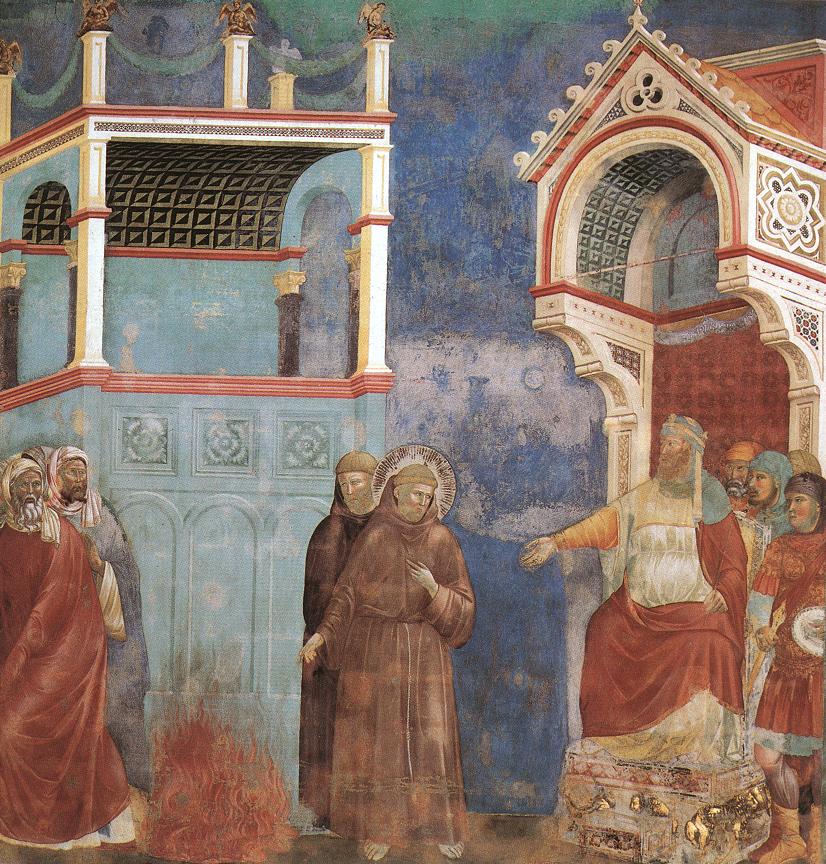meet the Sultan of Egypt

Saint Francis before the Sultan al-Kâmil (Trial by fire). Giotto di Bondone 1295. Fresco in the Basilica of Saint Francis, Italy
This meeting took place in Damietta in 1219 in the middle of the fifth crusade. In this plain of Egypt, two armies face each other: those of the Sultan facing the Crusader troops who are trying to take the port of Damietta.
It was in these circumstances that Saint Francis decided, with his companion, Brother Illuminé, to go before Sultan Malik al-Kamil in a process of dialogue.
This event, even if we know little about it and its interpretations diverge, represents one of the first great images of the Muslim-Christian encounter. It explains the choice of the city of Assisi as the place for interreligious meetings initiated by John Paul II in 1986. It inspired the journey of the Franciscans in Muslim lands.
The meditation of Saint Francis after this visit :
« Brothers, who go out among Muslims and other non-Christians, can consider their spiritual role in two ways: either, to make no lawsuits or disputes, to be subject to every human creature for the sake of God, and to confess simply that they are Christians; or, if they see that this is the will of God, to announce the Word of God so that non-Christians believe in the Almighty God, Father, Son and Holy Spirit, Creator of all things, and in his Redeemer Son and Saviour, are baptized and become Christians”.
On the site of the Franciscans (see the site), we can find the account given by Saint Bonaventure of the meeting between Saint Francis of Assisi and the Sultan of Egypt. This is the only detailed account of this encounter.
“Courageously exposing himself to constant danger, Francis wanted to go to the Sultan of Babylon in person. The war then raged, implacable between Christians and Saracens, and the two armies having taken position face to face in the plain, one could not without risking his life pass from one to the other.
But in the hope of getting what he wanted without delay, François resolved to go there. After praying, he obtained strength from the Lord and, full of confidence, sang this verse from the Prophet: « If I have to walk in the midst of the shadows of death, I will fear no evil, for you are with me ».
Having joined as a companion brother Illuminé, a man of intelligence and courage, he set out crossing the sea and finding himself in the country of the sultan. A few steps further on they fell into the outposts of the Saracens, and the latter, more rapid, rushed upon them. They heaped insults on them, chaining them and beating them. In the end, after mistreating and bruising them in every way, they brought them, in accordance with the decrees of divine Providence, into the presence of the sultan: this was what Francis had desired.
The prince asked them who sent them, why and in what capacity, and how they had come; with his beautiful assurance, Francis answered that he had been sent from beyond the seas not by a man but by the most high God to show him, to himself and to his people, the way of salvation and to announce to them the Gospel which is the truth. Then he preached to the sultan Triune God and Jesus, savior of the world, with such vigor of thought, such fortitude and such fervor of spirit that in him this verse of the Gospel was truly realized in a striking way: « I will put in your mouth a wisdom that all your enemies will not be able to resist or contradict. »
Witness of this ardor and this courage, the sultan listened to him with pleasure and urged him to prolong his stay with him. He offered Francis many rich gifts that the man of God despised like mud: it was not the riches of the world that he craved, but the salvation of souls.
The sultan conceived only the more devotion for him, to see in the saint such a perfect contempt for the goods here below. Francis left the sultan’s country escorted by his soldiers ».
“It seems, emphasizes Albert Jacquard (Le Souci des Pauvres, ed. Flammarion, 1996) that the sultan did not forget François’s smile, his gentleness in the expression of an unlimited faith. Perhaps this memory was decisive when he decided, ten years later, when no force forced him to do so, to return Jerusalem to the Christians. What the armies from Europe had been unable to obtain, the intelligence and tolerance of Malik al-Kamil would allow Islam to offer. Doubtless the clear gaze of François had continued its slow work in the conscience of this man open to the thought of others”.
C.D.
